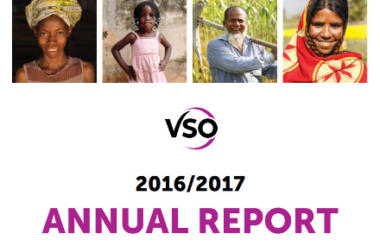International development charity VSO will no longer carry out door-to-door fundraising because of “insufficient long-term returns and high supporter attrition”, according to its annual report.
The charity had used door-to-door fundraisers since 2007 to recruit regular givers, but said in its annual report for 2016/17, published on its website, that it has stopped using this approach.
“Due to insufficient long-term returns and high supporter attrition, we chose to withdraw from door-to-door activity, and are diversifying the ways we recruit new regular givers", it said.
VSO raised £6m from 41,000 regular givers last year.
Doorstep fundraising has been criticised in the national media and by politicians, but has been defended by charities as a cost-effective way to recruit regular givers.
Last year RNLI pulled out of doorstep fundraising.
During 2016/17, VSO said it used the agencies APPCO and HOME for doorstep fundraising and that this accounted for the “majority” of its recruitment of new supporters. It said it had a number of safeguards in place to monitor this fundraising activity.
“Results were closely monitored on a weekly basis with status calls. We shadowed the fundraisers to better understand how they work in the field,” the charity said. “Several welcome calls were sent every two weeks, which were listened to by the VSO team. Feedback was then sent back to the team, and amendments made to practices. We held regular refresher workshops to ensure fundraisers were well informed about VSO and our work.”
Nicola Fickling, VSO’s head of individual giving, said: “We found that door to door fundraising wasn’t delivering the long-term relationships we want to have with supporters. The process of diversifying our recruitment has given us greater control of our messaging and messengers, meaning that we can better inspire supporters to donate for years to come.”
VSO also used the telemarketing agency Ethicall for telephone fundraising.
In 2016/17 it received 126 complaints relating to fundraising but said that it had “fully resolved” all complaints in “a timely manner”.
Gender pay reporting
VSO is one of the first charities to reveal its gender pay gap in its annual accounts.
It revealed that female employees do earn less than the male employees but the gap is less than the national average.
Based on a median average, women earn 4.47 per cent less at VSO, and by mean average they earn 6 per cent less. The median average for the whole of the UK is 18 per cent.
The charity said: “VSO guarantees equal pay for men and women in the same roles. This is achieved by external benchmarking of salaries per role (as opposed to job holder) every year against other organisations in all the countries we operate in. Roles are reviewed internally to ensure consistency between comparable positions. The job holder’s personal qualities (such as gender and age) are purposefully excluded from this exercise.”
VSO said that 60 per cent of its workforce is female, including half of those in the upper most salary quartile.
“Business development and human resources are traditionally less competitive and lower-paid fields of work and, therefore, generate lower benchmark figures,” the charity said. “In the UK these areas of work have tended to attract more women. There is a more competitive and higher paid market for finance and IT, which traditionally tend to attract more men.”
VSO employs 810 people with 244 based in the UK.
All organisations with more than 250 employees must publish details of their gender pay gap by April 2018. NCVO estimates that this will affect around 670 charities.
Sophie Paradis, VSO compensation and benefits analyst, said: “We are also proud to be one of the first major UK charities to publish details on gender pay disparity. The gender pay gap at VSO is more than three-times narrower that the UK average. However, we will never be complacent on this issue and continue to focus on reaching parity as soon as possible.”
From Charity Finance magazine
New three-year DfID grant agreed
Most of VSO’s income comes from the Department for International Development.
In 2016/17 it received a total strategic grant from DfID £20m. DfID extended this funding twice; first to cover the period to 31 December 2016 and then to 31 March 2017.
It said it has now agreed a three-year deal with DfID to “continue its partnership” through an “accountable grant for the delivery of a three-year volunteering for development programme”.
VSO also received £25m from DfID to deliver the International Citizen Service programme. This was down by £1.5m on the previous year.
Some £12m was received from other agencies, including USAID, the European Union and the United Nations.
The charity’s total income for the year was £78m, which was slightly down on last year when it was just over £80m. In 2016/17 it spent £76m and said that 92 per cent of this was on charitable activities.
|
Related articles












